Proposed expansion of school vouchers undermines public education in NC

The N.C. General Assembly is proposing to divert millions of taxpayer dollars, in an arguably unconstitutional manner, away from the public schools and into the hands of private and parochial schools with none of the transparency and accountability required of the public schools.
Senate Bill 406 and House Bill 832 will use tax dollars to support “Opportunity Scholarships” for the private education of children, not just from low-wealth families, but for the first time, to wealthy families and those already enrolled in private schools. SB 406 would provide over $2.2 billion of taxpayer money for private school vouchers over the next 10 years.
More: Fayetteville private schools: Millions in taxpayer funds, a Christian worldview
Egregiously, the General Assembly is allowing these privates and religious schools to discriminate against the children of the state based on religious beliefs and the personal characteristics of voucher applicants. Private and parochial schools can pick and choose students who align with their beliefs and reject others. The public schools are open to all regardless of race, creed, color, sexual orientation, and religious or political beliefs.
More: Fayetteville area leads in private school vouchers as NC may expand program
It was the genius of the 1868 NC Constitution which, in Article 9, made clear that a responsibility of state government was to provide for a free public education for all the children of the state, including children who were historically denied that opportunity due to race, religion, or financial resources. The N.C. Constitution did not include provisions for financing private and religious education with public tax dollars.
North Carolina’s Republican and Democratic governors and enlightened leaders of the General Assembly have long championed, if not always well-financed, public education in North Carolina. Rather than divert millions of our tax dollars to unaccountable private and often discriminatory schools, the General Assembly should address the unmet needs of the public schools (mostly rural) across North Carolina, as documented in the long-standing Leandro Case.
Embarrassingly, North Carolina now ranks 50th in school funding efforts and 48th in overall funding level according to the most recent “Making the Grade” report by the Education Law Center. Beginning teacher pay in North Carolina is now below every state in the Southeast, except West Virginia. North Carolina is now nearly $12,000 below the national average for teacher pay. Mississippians can now say, “Thank God for NC”.
The ideology driving these twin bills is intended to degrade public education. They shift the scales of responsibility from doing what is best for the common good of the people of North Carolina to a self-serving ‘what’s in it for me’ — at taxpayer expense.
The great majority of North Carolinians love and support their local public schools and teachers. They also know that a well-educated, civically engaged public is key to creating and sustaining a flourishing state in which to live.
We understand what our nation’s founding fathers understood, that public education is essential to maintaining a democracy. The diversion of public money to private and religious education is not only undermines our public schools, but it also undermines our free and democratic society.
We urge the General Assembly to reject SB 406 and HB 823.
Friends of Public Education. Steering Committee: Charles R. Coble, Larry Coble, Janice Davis, Nancy Farmer, Bill Harrison, Dick Jones, Larry Mabe, and Michael D. Priddy.
This article originally appeared on The Fayetteville Observer: Proposed expansion of school vouchers undermines public education in NC

